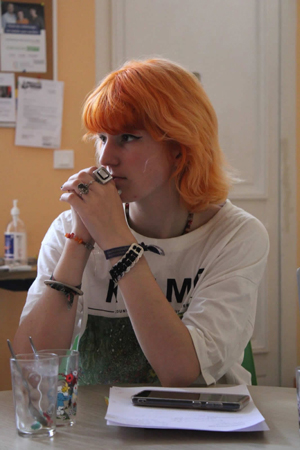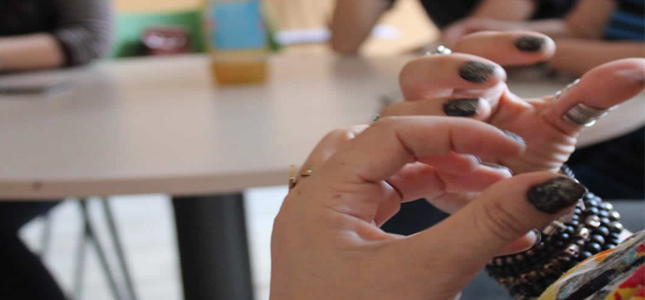“It was the wish of my children”. Rapes, abortions of baby girls… An Iranian lawyer, living in Nancy, France, does not only tell her story of exile. But above all, the story of girls and women in todays' Iran.
By Athénaïs Lachat, student at Science Po, Nancy. Editor Elda Spaho Bleta Translation in English from French original by Elda Spaho Bleta

Helena* was born in 1978, in Tehran. Unofficially, and in reality, she is now 44 years old. But officially, she is 47, her father having falsified her birth certificate to be able to marry her earlier. "I come from a family where, having a daughter, is a shame and it's demeaning. For them, a girl means a physical and sexual slave”.
Being a child-girl in Iran
She grew up in a violent environment. A lawyer now, Helena is still terrified of her father. Since the beginning of her life, he mistreats both of them, her mother and her. Mother, unable to bear it any longer, ends up leaving home when Helena is only a little girl. This departure leaves the field open to her father, who forces her to stop her studies so that she can work. Helena recalls that he was in debt and uses her to earn money. He ends up forcing her to "work" with a friend, a wealthy and influential 37-year-old man. Helena is only 15… In order to “work”, she has to leave Tehran for another city. This departure marks the beginning of a dark period. “When the law of a country allows a so-called brother, father, or grandfather to do whatever they want to a young girl, well, then the life of this girl becomes hell”, - she says.
Women's rights in Iran are trampled on daily. As Javaid Rehman1, a professor of international law and Muslim constitutional scholar, explains, women are seen as second-class citizens. This is confirmed by Iranian legislation which openly encourages discrimination against women. For example, it is stipulated that they can marry from the age of 13, and even earlier with the consent of the father, according to Javaid Rehman.
This resulted in many forced marriages. According to a study by the Iranian Center for Human Rights published in 20202, 7,323 marriages of girls aged 10 to 14 were registered between March and June 2020.
Also, for a woman, it is almost impossible to file for divorce in Iran. She must prove an intolerable level of violence while the husband can divorce without any justification, as the International Center for Minority and Human Rights Defenders found in a 2019 report3.
State protections for women are almost non-existent. When Helena begins to "work" with her father's friend, she endures physical and psychological torture. Despite these life conditions, she dares not do anything. "I was regularly raped and at the age of 17 I got pregnant by this man", - she tells.
He and his family value exclusively the fact of giving birth to boys. And Helena's first child is a girl, according to ultrasounds. She is therefore forced to have an abortion after 18 weeks of pregnancy. This abortion involves great risks for women. In France, it is illegal to abort from 14 weeks of pregnancy as stipulated by the Public Service, official site of the French administration4.
But for this 17-year-old girl, it's just the beginning of a long series of pregnancies...
"I didn't want a dead girl anymore."
In 1998, Helena finally had a child she could keep. He was a boy. Her father's friend continues to rape her to have more boys, which is considered prestigious in his family. Helena therefore gave birth to another boy in 2001. Then she had to abort two other girls…
In 2011, the young woman had her last boy. She falls pregnant again a few months later, but she chooses to abort immediately without her abuser knowing it. The young woman no longer wants to have another child, and above all “I no longer wanted a dead girl”.
Helena lived with her three boys in the huge residence of her father's friend. However, she does not really live with him, she resides in an isolated wing of the building. He has several wives. The young woman therefore hardly exchanges with this man and continues to take care of her children.
After years of ordeal, Helena's father dies. She goes to his bedside, where he begs her forgiveness. She simply replies, "I don't forgive you".
- How did you feel that day?
- The day my father died, I felt liberated. I put on make-up, I went to the hairdresser… I felt relieved…
A very expensive freedom
Once her father dead, Helena finds the courage to flee the house where she lives. She is even ready to leave there her children. She is not afraid of something bad happening to them: their father is very proud of his "three boys". But for him, when she abandons, it’s the great shame. He's ready to do everything and he threatens her with the worst: If you don't come back, I'll sell the three boys!
So, she comes back to protect her children. “In order to punish me, he tortured and beat me. But I resisted and I did not get weaker. My father being dead, I was no longer afraid, and I began to disobey. I decided to work, while resuming my studies. Everything was done in secret, since the house where I lived with my children was an aside apartment. I was not his wife. I went on pursuing a law degree because I wanted to be a lawyer. By changing the law, I could live better”.
But he ends up discovering his activities. Mad with rage, this time he forces her to officially marry him. "And, as a married woman in Iran, you have no legal right to disobey your husband."
Yes, because the Iranian Islamic Penal Code dedicates an entire section to marital duties. This code specifies that women “must always provide for the sexual needs of their husbands” (article 1108). It is also specifying “that husbands determine the place of residence of their wives and therefore control their freedom of movement” (article 1114). They can also prevent them from exercising a certain profession if they consider that it is “incompatible with the interests of the family” (article 1117).
Helena's efforts to study and work became illegal through her marriage. Despite this, despite the violence she suffers, she continues her studies. “In the end, the problems became my sources of ambition. The more problems I had, the more efforts I wanted to put in".
She becomes a lawyer in secret. Her efforts increasingly irritate her husband, who continues to be violent. He regularly threatens her to take her third child, with whom she is very attached since he is very young. The Iranian civil code specifies that the mother has custody of the child until he is two years old. “After that, custody devolves to the father,” - notices the United States Institute of Peace in a 2020 article, titled “Iranian Women’s Laws6”.
Run away! But how?
Faced with these threats, Helena makes a decision: She must leave Iran with her last child. She takes steps in secret and obtains a “student” visa for Nancy, France, valid from September 1, 2020. However, she is not at the end of her troubles. In Iran, married women and children must have permission to leave the country. Children must thus obtain the agreement of their father and married women, that of their husband, in accordance with the law stipulates that a man can prohibit his wife from going abroad.
Helena therefore decides to set a trap for her husband. With her savings, she buys a car, and her husband allows it to be put in her name. Helena brings him the authorization papers to leave the territory, making him believe that these are the papers for the car. Her husband, not having done much studying, signs. Helena can now leave. But she doesn't know how to get the authorization for her son... She has no more ideas... "So I chose to stay in Iran: there was no question of me abandoning my child." However, the violence continues to escalate. It peaks on Thursday, September 16, 2020.
“I will never forget this day. I don't know why my husband decided to kill me. Maybe he was tired with me…”. While the reason behind this decision is unclear, its consequences are: While Helena's two oldest sons are not at home and the third one is sleeping, her husband and his brothers wake her up to take her to her car. There, a can of gasoline waits for her. "The goal was to burn me in my own car."
To do this, her husband drives to take her to a secluded place. Fortunately, there are several traffic jams in the street, and Helena escapes from the vehicle. Her husband and brothers chase after, throwing gasoline on her. She calls for help, but no one dares to respond to a woman. “However, the police came and told them, 'Shut that woman's mouth and put her in the car. People are filming it and they're going to put it on social media."
Helena is escorted home by the police, who do not question the situation. But, for the moment, her husband does not dare to continue with his plan. Their two grown children are there, too. They learn what happened and, once their father leaves, they beg her to leave so that she stays alive. “The very next day, my two oldest sons wake me up. They had prepared the traveling papers for me and bought a ticket for Tehran. I already had the signed authorizations from my husband. I left on a Friday to stay alive. It was the wish of my children”.
Freedom, but at what cost? ?
Arrived in Tehran, Helena takes a plane ticket for Paris. Then from Paris, she arrives in Nancy where, using her “student” visa, she re-enrolls at university. Finally, she is free to study law. Arrived legally in France, she is not aware of the fact that it is possible she demands asylum. When she understands this, Helena applies for asylum in France on July 19, 2021, and luckily obtains it in January 2022.
But the price of this freedom is very bitter: loneliness, very long and complicated regularization procedures in France, lack of work, depression, the hospital, sadness, the mad desire to see her children… But that is another story. Which will be told another time...
*The name of the person has been change in order to protect the identity.
Référénces:
1Javaid Rehman, “Iran: women and girls treated as second class citizens, reforms urgently needed,” 2021
2Human Rights, “Easy state loans prompting surge in child marriages in Iran”
3Centre for Supporters of Human Rights and Minority Rights Group International, “Beyond the Veil : Discrimination against women in Iran”, 2019
4Service Public, “Interruption volontaire de grossesse”, 2022
5Andrew Hanna, “Iranian Laws on Women,” 2020
* This article is produced as part of the “Coming together, telling stories, getting mobilized” project, a partnership between the PRO IDE information platform and the Secours Catholique Caritas Hauts de Lorraine, with the financial support of the latter. It was written by Athénaïs Lachat, student at Political Sciences university Paris, campus of Nancy, volunteer (2022) with Secours Catholique Caritas Hauts de Lorraine, and edited by Elda Spaho Bleta, journalist, founder of PRO IDE. The sources of the information are quoted, and when a personal opinion is given, it engages only the author. The content of the articles does not engage the previously named structures.


